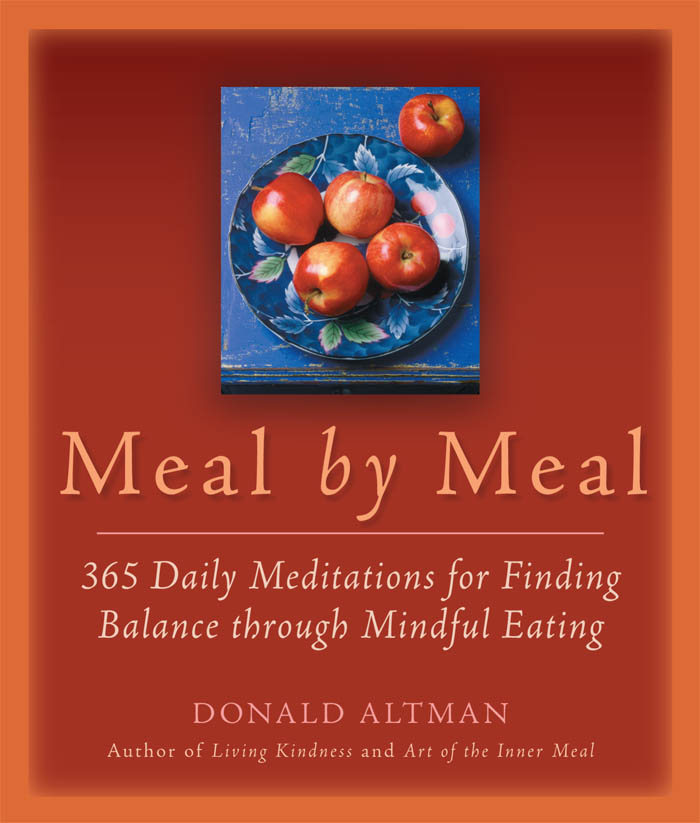
T HIS WORK IS A BLESSING WHICH HAS BEEN MADE possible through the efforts of many. My gratitude extends to all those wise beings, guides, and teachers who have helped me find a kinder, more compassionate, and enlightened way to live and work with others. In particular, I would like to thank Karen Bouris for her ongoing vision, enthusiasm, and belief in the potential of this book; editor John Nelson for his creative input, ideas, and support; disordered eating specialist Jacki Abbott for her wise guidance and sharing of experiences; Lindsey Hall for her support and thoughtfulness; Katie McMillan, Alma Bune, and the staff at Inner Ocean Publishing for all their caring effort and ideas; my agents Arielle Ford and Brian Hilliard for their guidance; friend and writer Randy Fitzgerald for his always wise and generous feedback; friend John Morley for his kind sharing of his Wry, Wit and Wisdom collection of quotes; my mother Barbara for always being a beacon of light and laughter; and especially, my wife Sanda for her tireless support and her nourishing meals that gave me the energy and well-being needed to create this book.
Entry
My doctor told me to stop having intimate dinners
for four. Unless there are three other people.
O RSON W ELLES
 A STRONG APPETITE CAN DRIVE YOU TO distraction. Prior to a meal, has your appetite ever caused you to buy more in a grocery store or order more in a restaurant than you (or maybe Orson Welles) could eat at one sitting? If so, welcome to the club.
A STRONG APPETITE CAN DRIVE YOU TO distraction. Prior to a meal, has your appetite ever caused you to buy more in a grocery store or order more in a restaurant than you (or maybe Orson Welles) could eat at one sitting? If so, welcome to the club.
Having a good appetite is important because it means you feel your body and its needs. Appetite is useful for another reason. It can help you more deeply tune into your hunger.
Have you ever tried to distinguish between three different kinds of appetite? First, there is your hunger that is provoked by sense desire (seeing, tasting, touching, or smelling food). Next, there is appetite that is stimulated by your physical need for energy or nourishment, and your bodys internal clock. Lastly, there is craving for food that is provoked by habit or emotional conditioning, such as wanting comfort food when feeling stressed or lonely.
Awaken to the deeper cause
of todays appetite.
Choices
People are capable of tremendous self-sacrifice and
self-giving when they are in love.... The center of
the persons life has become the beloved.
T HELMA H ALL , Too Deep for Words
 H AVE YOU EVER BEEN TOO ILL OR SICK TO EAT ? When you felt better, did you choose that first meal carefully as you might for a beloved (yourself )?
H AVE YOU EVER BEEN TOO ILL OR SICK TO EAT ? When you felt better, did you choose that first meal carefully as you might for a beloved (yourself )?
If you are going to choose foods that are truly life-sustaining and enhancing, then you need to feel like the most precious beloved one in your life! Before eating, you can practice loving kindness toward yourself.
Find a quiet and peaceful place. Sit with your eyes closed, and imagine yourself as a young child (or adult) worthy of love. Then, envision a caring benefactor (a parent, ancestor, or spiritual friend) who sends you a deep wish for your total well-being and happiness.
Let this heartfelt wish flow into your heart. Even if this takes time, stay with it until you feel love flowing through your whole body. Then repeat over and over:From this space of love may I choose the foods that offer me health and well-being.
Practice loving kindness toward yourself
for five to ten minutes before choosing
what you will eat.
Preparations
Be prepared.
B OY S COUT MOTTO
 D ID YOU EVER EXPERIENCE HOW THE LACK OF preparation could drastically alter a meal? Lacking a simple utensil, like a corkscrew or can opener, might mean missing out on something special. Improvising can be fun, but it is always nice to have all the choices available to you.
D ID YOU EVER EXPERIENCE HOW THE LACK OF preparation could drastically alter a meal? Lacking a simple utensil, like a corkscrew or can opener, might mean missing out on something special. Improvising can be fun, but it is always nice to have all the choices available to you.
Cooking and preparing a meal is a lot like going camping. If you forget to bring along your flashlight, you might have a difficult time putting up the tent. That is why mealtime preparation is for your own benefit and peace of mind.
Appreciate the beauty, precision, and effort that went into crafting each utensil and tool. Clean and care for these tools as you would a precious instrument or jewel. The right tools can truly help make your meal blissful, sacred, and memorable.
Appreciate how the right utensils complete
the sacredness of preparation.
Rituals
The Indians addressed all of life as a thou the
trees, the stones, everything. You can address
anything as a thou, and if you do it, you can feel
the change in your own psychology.
J OSEPH C AMPBELL , The Power of Myth
 D ID YOU EVER SPEND TIME IN THE COUNTRY or on a farm witnessing the lives of farmers, animals, plants, and the food closer up? A ritual act can serve the same purpose of bringing you into contact with both the source of food and what Joseph Campbell refers to asthou.
D ID YOU EVER SPEND TIME IN THE COUNTRY or on a farm witnessing the lives of farmers, animals, plants, and the food closer up? A ritual act can serve the same purpose of bringing you into contact with both the source of food and what Joseph Campbell refers to asthou.
When I was in my twenties, for example, I awakened to my dependence on the growers of food and plant and animal life. At that time I spent a couple of days on a family-run Wisconsin dairy farm, witnessing up close the relationship between the dairy farmer and the cows that provide the milk and cheese products I had taken for granted. I got a sense of how the land had been cared for and worked by this family through several generations.
The next time you say a blessing of gratitude over your food, know that the taste it contains touches more than you can imagine.
Experience the sacred thou as you
invoke your ritual blessing.
Eating
Dieting is murder on the road. Show me a man
who travels and Ill show you one who eats.
B RUCE F ROEMMING, BASEBALL UMPIRE
 A RE THERE TIMES WHEN YOU FIND IT ESPECIALLY difficult to eat mindfully and with awareness? For some, traveling can trigger mindless eating and craving. For others, any tense situation that takes you out of your comfort zone can cause this. What takes you from mindful to mindless eating?
A RE THERE TIMES WHEN YOU FIND IT ESPECIALLY difficult to eat mindfully and with awareness? For some, traveling can trigger mindless eating and craving. For others, any tense situation that takes you out of your comfort zone can cause this. What takes you from mindful to mindless eating?
It is easier to manage food and mindfulness when you are in your own environment and emotionally calm. The trick is to be able to bring mindfulness with you regardless of the stresses and location where you happen to be.
Whenever you feel vulnerable to mindless eating, take a mindful breath between each bite. Then, count the number of times that you chew. Together, these two mindful simple practices will slow you down and bring you back to mindfulness.
Invite mindful eating with awareness
of breath and chewing.
Community
If you sat for fifteen minutes repeating
hate, hate, hate, you would be the worse for it;
yet this is just what we do when we keep
dwelling on resentments.
E KNATH E ASWARAN , The Mantram Handbook
 H AVE YOUR EVER DIRECTED THE REFRAIN BLAME , blame, blame, or shame, shame, shame, or should have, should have, should have, at yourself or others during a meal? Instead of dwelling on what you think or feel is wrong, you can use food and community to catapult you into a positive state of mind and emotions.
H AVE YOUR EVER DIRECTED THE REFRAIN BLAME , blame, blame, or shame, shame, shame, or should have, should have, should have, at yourself or others during a meal? Instead of dwelling on what you think or feel is wrong, you can use food and community to catapult you into a positive state of mind and emotions.
The great Hindu sage Vivekananda felt that most people too readily focus on their personal weaknesses instead of their vast heritage of knowledge and wholeness. I believe you can tap into this wholeness simply by reciting positive thoughts during your meal. You can, for example, silently repeat a word or phrase such aslove, loving kindness, orliving kindness over and over.

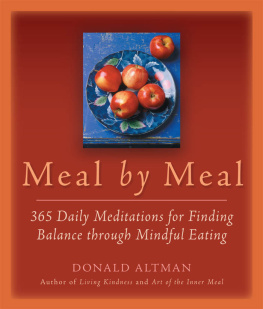
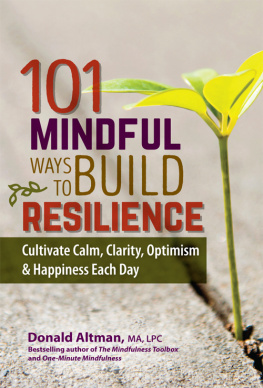
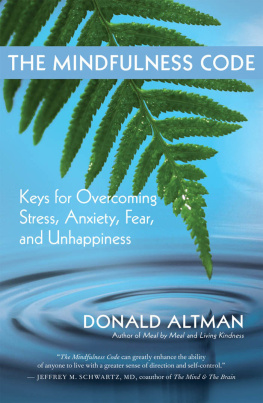
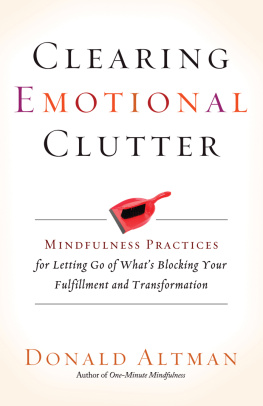
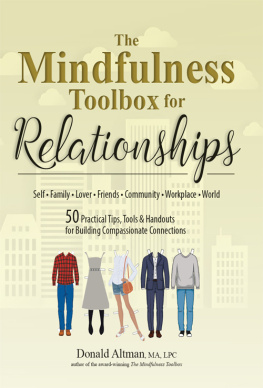
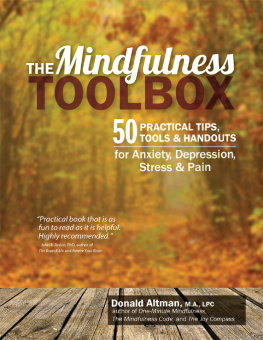
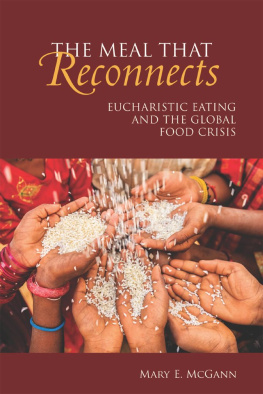

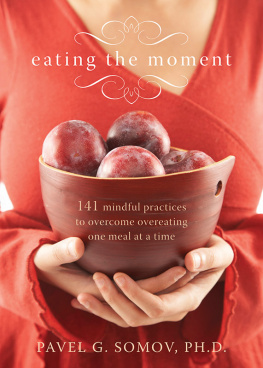
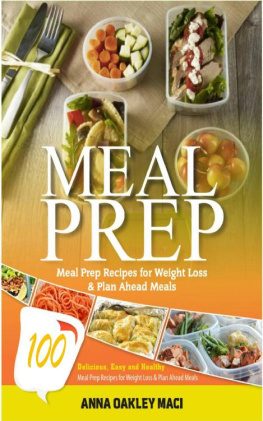
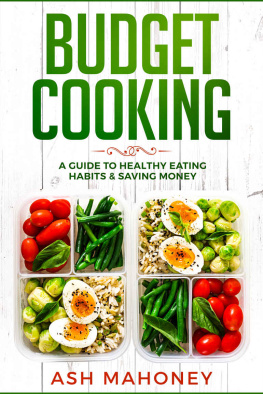


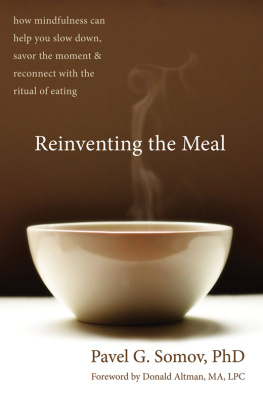
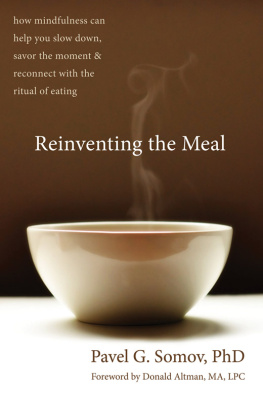
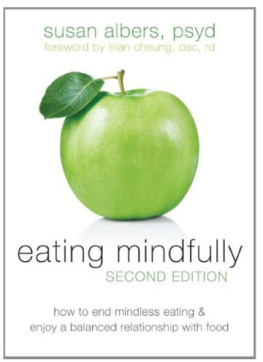

 A STRONG APPETITE CAN DRIVE YOU TO distraction. Prior to a meal, has your appetite ever caused you to buy more in a grocery store or order more in a restaurant than you (or maybe Orson Welles) could eat at one sitting? If so, welcome to the club.
A STRONG APPETITE CAN DRIVE YOU TO distraction. Prior to a meal, has your appetite ever caused you to buy more in a grocery store or order more in a restaurant than you (or maybe Orson Welles) could eat at one sitting? If so, welcome to the club. H AVE YOU EVER BEEN TOO ILL OR SICK TO EAT ? When you felt better, did you choose that first meal carefully as you might for a beloved (yourself )?
H AVE YOU EVER BEEN TOO ILL OR SICK TO EAT ? When you felt better, did you choose that first meal carefully as you might for a beloved (yourself )? D ID YOU EVER EXPERIENCE HOW THE LACK OF preparation could drastically alter a meal? Lacking a simple utensil, like a corkscrew or can opener, might mean missing out on something special. Improvising can be fun, but it is always nice to have all the choices available to you.
D ID YOU EVER EXPERIENCE HOW THE LACK OF preparation could drastically alter a meal? Lacking a simple utensil, like a corkscrew or can opener, might mean missing out on something special. Improvising can be fun, but it is always nice to have all the choices available to you. D ID YOU EVER SPEND TIME IN THE COUNTRY or on a farm witnessing the lives of farmers, animals, plants, and the food closer up? A ritual act can serve the same purpose of bringing you into contact with both the source of food and what Joseph Campbell refers to asthou.
D ID YOU EVER SPEND TIME IN THE COUNTRY or on a farm witnessing the lives of farmers, animals, plants, and the food closer up? A ritual act can serve the same purpose of bringing you into contact with both the source of food and what Joseph Campbell refers to asthou. A RE THERE TIMES WHEN YOU FIND IT ESPECIALLY difficult to eat mindfully and with awareness? For some, traveling can trigger mindless eating and craving. For others, any tense situation that takes you out of your comfort zone can cause this. What takes you from mindful to mindless eating?
A RE THERE TIMES WHEN YOU FIND IT ESPECIALLY difficult to eat mindfully and with awareness? For some, traveling can trigger mindless eating and craving. For others, any tense situation that takes you out of your comfort zone can cause this. What takes you from mindful to mindless eating? H AVE YOUR EVER DIRECTED THE REFRAIN BLAME , blame, blame, or shame, shame, shame, or should have, should have, should have, at yourself or others during a meal? Instead of dwelling on what you think or feel is wrong, you can use food and community to catapult you into a positive state of mind and emotions.
H AVE YOUR EVER DIRECTED THE REFRAIN BLAME , blame, blame, or shame, shame, shame, or should have, should have, should have, at yourself or others during a meal? Instead of dwelling on what you think or feel is wrong, you can use food and community to catapult you into a positive state of mind and emotions.